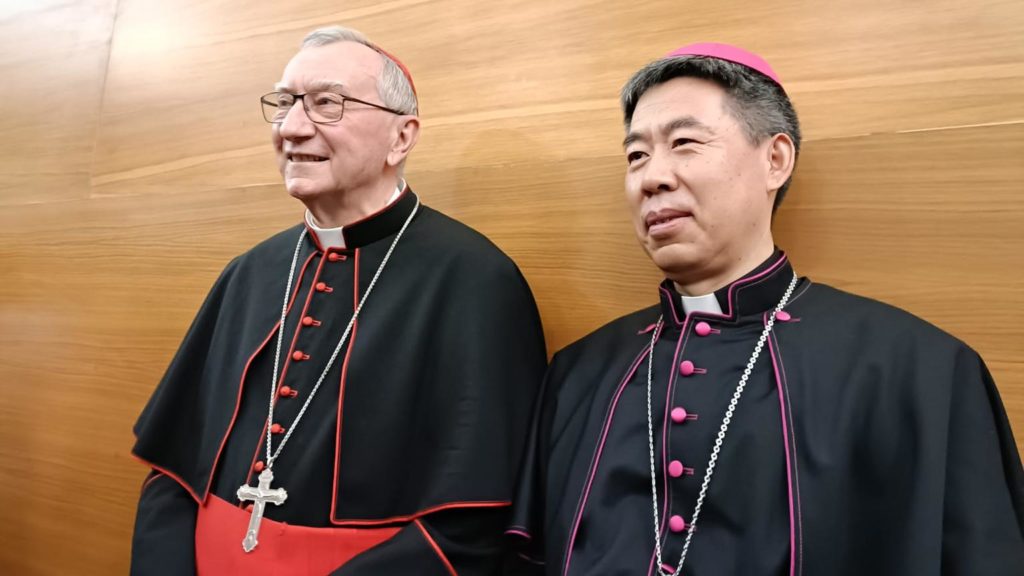Vatican Secretary of State Italian Cardinal Pietro Parolin has said both parties to a controversial deal with Chinese authorities on episcopal appointments hope that it will be renewed for a third time when it expires later this year.
Speaking to journalists on the margins of a high-profile May 21 conference on Vatican-China relations, Parolin said of the deal, “We are all interested in the agreement being renewed.”
He said the deal could be “also developed in some points,” but did not expand on what those details might be.
Parolin was a keynote speaker at a day conference titled, “100 years since the Concilium Sinense: Between history and present,” which was held Tuesday at Rome’s Pontifical Urban University, marking the 100th anniversary of the Council of Shanghai.
The deal he referred to is a controversial provisional agreement between the Holy See and Chinese authorities on the appointment of bishops. Struck in 2018, the deal had a duration of two years and has been renewed twice for additional two-year periods.
Set to expire again in October, the deal is considered “secret,” as the terms have never been made public. It is believed to be similar to the Holy See’s agreement with Vietnam, which allows the pope to choose from a selection of candidates put forward by government officials.
Still considered provisionary, though it has been in force for nearly six years, the deal has been a source of widespread controversy, including from top personalities such as Cardinal Joseph Zen, the retired bishop of Hong Kong, over religious freedom concerns in China, as well as several breeches of the deal by Chinese authorities.
In November 2022 Chinese officials installed Bishop John Peng Weizhao an auxiliary bishop for the Diocese of Jiangxi, an ecclesiastic territory recognized by Chinese authorities but not by the Vatican, without the Vatican’s knowledge or approval.
Peng Weizhao had been appointed to the papally-recognized Diocese of Yujiang by Pope Francis in 2014, four years prior to the 2018 agreement. Considered an “underground” prelate not recognized by authorities, Peng Weizhao was arrested and held for six months before being released under strict observation.
Last April, Chinese authorities breached the agreement again by transferring Bishop Shen Bin of the nearby Diocese of Haimen to the Diocese of Shanghai, which had been vacant for 10 years, without the Vatican’s prior knowledge or approval.
The Church in China for decades has been divided into an “official” Church run by the government-backed Chinese Patriotic Catholic Association (CPCA), and a so-called “underground” Church in union with Rome. The 2018 deal, ostensibly, was intended to unite the two.
Pope Francis formally accepted Shen Bin’s transfer in July of last year, with the announcement published alongside an interview with Parolin in which he suggested that a permanent resident papal representative be appointed in Beijing.
Shen Bin, who is president of the CPCA, was a keynote speaker at Tuesday’s conference.
In his remarks to journalists, Parolin was opaque about the possibility of having a papal representative in Beijing, saying, “It’s always difficult to make predictions.”
“We hope, for a long time now, to have a stable presence in China, even if initially it might not have the form of a pontifical representative of an apostolic nunciature,” he said, saying the point is “to increase and deepen our contact.”
“This is our aim. The form can be different, we are not fixed on only one way. We hope that with the passing of time, the more relations deepen, there would be this step,” he said.
Asked whether the Vatican would formally recognize the CPCA, Parolin said this is “a topic of discussion, in such a way that it includes all Chinese bishops,” but he would not commit to a timeline, saying, “It’s still a working topic.”
Speaking of the Council of Shanghai, Parolin said he was inspired by it in the sense of “not being afraid to face this topic, even if it’s an especially difficult, complicated issue, and to have patience.”
“It requires patience, we all need patience, and also in having a lot of hope,” he said, noting how in his speech earlier in the day he referred to the metaphor of seeds being tossed on the ground.
“Even if they don’t appear to bear fruit immediately, in the end they germinate and always give a little harvest,” he said.

